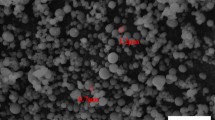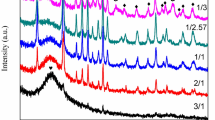Abstract
Simultaneous improvement of mechanical and microwave absorption properties of the composites at high temperatures still undergoes considerable challenges. We have investigated the high-temperature microwave absorbing properties of the silicon carbide fiber-reinforced oxide matrices (SiCf/mullite–SiO2) composite on the basis of our previous work. Results indicate that the complex permittivity increases from 8.19 − j5.09 to 16.39 − j9.83 at 10 GHz with the temperature rising from 200 to 600 °C. The SiCf/mullite–SiO2 composite has relatively high tanδ values indicating superior microwave attenuation ability. The reflection loss (RL) values of the composite increase with rising thickness. It can be noticed that the RL response curves of different thicknesses are basically consistent at 200 and 400 °C. In addition, the RL value of the composite is less than − 5 dB in the whole X band when the thickness is under 2.9 mm and the temperature is below 400 °C. The hybrid oxide matrices of mullite and SiO2 are beneficial to improve the dielectric properties, especially high-temperature microwave absorption properties of the SiC fiber-reinforced ceramic matrix composite. The superior microwave absorption properties indicate that the SiCf/mullite–SiO2 composite is a promising candidate in aircraft engine nozzle and aerodynamic heating parts of aircrafts at high temperatures.








Similar content being viewed by others
Explore related subjects
Discover the latest articles and news from researchers in related subjects, suggested using machine learning.References
Kong L, Yin XW, Li Q, Ye F, Liu Y, Duo GY, Yuan XW (2013) High-temperature electromagnetic wave absorption properties of ZnO/ZrSiO4 composite ceramics. J Am Ceram Soc 96:2211–2217
Huang Y, Li N, Ma YF et al (2007) The influence of single-walled carbon nanotube structure on the electromagnetic interference shielding efficiency of its epoxy composites. Carbon 45:1614–1621
Cao MS, Song WL, Hou ZL, Wen B, Yuan J (2010) The effects of temperature and frequency on the dielectric properties, electromagnetic interference shielding and microwave-absorption of short carbon fiber/silica composites. Carbon 48:788–796
Qing YC, Wen QL, Luo F, Zhou WC (2016) Temperature dependence of the electromagnetic properties of graphene nanosheet reinforced alumina ceramics in the X-band. J Mater Chem C 4:4853–4862
Qing YC, Wang X, Zhou YY, Huang ZB, Luo F, Zhou WC (2014) Enhanced microwave absorption of multi-walled carbon nanotubes/epoxy composites incorporated with ceramic particles. Compos Sci Technol 102:161–168
Chung DDL, Luo XC (1996) Electromagnetic interference shielding reaching 130 dB using flexible graphite. Carbon 34:1293–1303
Liu QL, Zhang D, Fan TX, Gu JJ, Miyamoto Y, Chen ZX (2008) Amorphous carbon-matrix composites with interconnected carbon nano-ribbon networks for electromagnetic interference shielding. Carbon 46:461–465
Joseph N, Sebastian MT (2013) Electromagnetic interference shielding nature of PVDF-carbonyl iron composites. Mater Lett 90:64–67
Liang JJ, Wang Y, Huang Y et al (2009) Electromagnetic interference shielding of graphene/epoxy composites. Carbon 47:922–925
Liu HT, Cheng HF, Wang J, Tang GP (2010) Effects of the single layer CVD SiC interphases on the mechanical properties of the SiCf/SiC composites fabricated by PIP process. Ceram Int 36:2033–2037
Kotani M, Inoue T, Kohyama A, Katoh Y, Okamura K (2003) Effect of SiC particle dispersion on microstructure and mechanical properties of polymer-derived SiC/SiC composite. Mater Sci Eng A 357:376–385
Wang HD, Feng Q, Wang Z, Zhou HJ, Kan YM, Hu JB, Dong SM (2017) Microstructure evolution and high-temperature mechanical properties of SiCf/SiC composites in liquid fluoride salt environment. Corros Sci 124:131–137
Hu Y, Luo F, Yang ZN, Zhou WC, Zhu DM, Duan SC (2017) Improvement dielectric and microwave properties of SiCf/SiC-AlPO4 composites prepared by precursor infiltration and pyrolysis process. J Alloy Compd 699:498–504
Mohan A, Udayakumar A, Gandhi AS (2017) High temperature oxidation behaviour of CVD β-SiC seal coated SiCf/SiC composites in static dry air and combustion environment. Ceram Int 43:9472–9480
Mu Y, Zhou WC, Wan F, Ding DH, Hu Y, Luo F (2015) High-temperature dielectric and electromagnetic interference shielding properties of SiCf/SiC composites using Ti3SiC2 as inert filler. Compos Part A Appl Sci Manuf 77:195–203
Mu Y, Zhou WC, Hu Y, Wang HY, Luo F, Ding DH, Qing YC (2015) Temperature-dependent dielectric and microwave absorption properties of SiCf/SiC–Al2O3 composites modified by thermal cross-linking procedure. J Eur Ceram Soc 35:2991–3003
Zhang XS, Yang LW, Liu HT (2018) Enhancements in mechanical and electrical properties of carbon nanotube films by SiC and C matrix bridging. J Mater Sci 53:11027–11037. https://doi.org/10.1007/s10853-018-2385-2
Jian K, Chen ZH, Ma QS, Hu HF, Zheng WW (2007) Effects of polycarbosilane infiltration processes on the microstructure and mechanical properties of 3D-Cf/SiC composites. Ceram Int 33:905–909
Mu Y, Zhou WC, Wang HY, Wang C, Qing YC (2014) Mechanical and dielectric properties of 2.5D SiCf/SiC-Al2O3 composites prepared via precursor infiltration and pyrolysis. Mater Sci Eng A 596:64–70
Wang Q, Cao F, Xiang Y, Peng ZH (2017) Effects of ZrO2 coating on the strength improvement of 2.5 D SiCf/SiO2 composites. Ceram Int 43:884–889
Wilshire B, Carreno F (2000) Deformation and damage processes during tensile creep of ceramic-fibre-reinforced ceramic–matrix composites. J Eur Ceram Soc 20:463–472
Han S, Yang LW, Liu HT, Sun X, Jiang R, Mao WG, Chen ZH (2017) Micro-mechanical properties and interfacial engineering of SiC fiber reinforced sol-gel fabricated mullite matrix composites. Mater Des 131:265–272
Gao H, Luo F, Wen QL, Duan SC, Zhou WC, Zhu DM (2018) Influence of different matrices on the mechanical and microwave absorption properties of SiC fiber-reinforced oxide matrix composites. Ceram Int 44:6010–6015
Song HH, Zhou WC, Luo F, Huang ZB, Qing YC, Chen ML, Mu Y (2015) Temperature dependence of dielectric properties of SiCf/PyC/SiC composites. Mater Sci Eng B 195:12–19
Dong N, Chen LQ, Yin XW, Ma XK, Sun XN, Cheng LF, Zhang LT (2016) Fabrication and electromagnetic interference shielding effectiveness of Ti3Si(Al)C2 modified Al2O3/SiC composites. Ceram Int 42:9448–9454
Xu YX, Lu R, Li L (2004) Structure of colloid aggregation in silic sol silic and its colloid concretion during drying–one of some knowledges on molding shell with silic sol. Spec Cast Non Ferrous Alloy 2:52–54
Sato T, Ishizuka M, Shimada M (1986) Sintering and characterization of mullite-alumina composites. Ceram Int 12:61–65
Ding DH, Zhou WC, Luo F, Chen ML, Zhu DM (2012) Dip-coating of boron nitride interphase and its effects on mechanical properties of SiCf/SiC composites. Mater Sci Eng A 543:1–5
Micheli D, Apollo C, Pastore R, Marchetti M (2010) X-Band microwave characterization of carbon-based nanocomposite material, absorption capability comparison and RAS design simulation. Compos Sci Technol 70:400–409
Hu QY, Bian JH, Jin L et al (2018) Debye-like relaxation behavior and electric field induced dipole re-orientation of the 0.6BaTiO3-0.4Bi(Mg1/2Ti1/2)O3 ceramic. Ceram Int 44:922–930
Tian H, Liu HT, Cheng HF (2013) Effects of SiC contents on the dielectric properties of SiO2f/SiO2 composites fabricated through a sol-gel process. Powder Technol 239:374–380
Qing YC, Wen QL, Luo F, Zhou WC, Zhu DM (2016) Graphene nanosheets/BaTiO3 ceramics as highly efficient electromagnetic interference shielding materials in the X-band. J Mater Chem C 4:371–375
Min DD, Zhou WC, Qing YC, Luo F, Zhu DM (2017) Greatly enhanced microwave absorption properties of highly oriented flake carbonyl iron/epoxy resin composites under applied magnetic field. J Mater Sci 52:2373–2383. https://doi.org/10.1007/s10853-016-0532-1
Correia NT, Ramos JJM (2000) On the cooperativity of the β-relaxation: a discussion based on dielectric relaxation and thermally stimulated depolarisation currents data. Phys Chem Chem Phys 2:5712–5715
Xu P, Fu WJ, Hu YD, Ding YS (2018) Effect of annealing treatment on crystalline and dielectric properties of PVDF/PEG-containing ionic liquid composites. Compos Sci Technol 158:1–8
Ryu HY, Wang Q, Raj R (2010) Ultrahigh-temperature semiconductors made from polymer-derived ceramics. J Am Ceram Soc 93:1668–1676
Liu Y, Luo F, Su JB, Zhou WC, Zhu DM (2015) Mechanical, dielectric, and microwave-absorption properties of alumina ceramic containing dispersed Ti3SiC2. J Electron Mater 44:867–873
Wen QL, Zhou WC, Wang YD, Qing YC, Luo F, Zhu DM, Huang ZB (2017) Enhanced microwave absorption of plasma-sprayed Ti3SiC2/glass composite coatings. J Mater Sci 52:832–842. https://doi.org/10.1007/s10853-016-0379-5.
Qing YC, Zhou WC, Luo F, Zhu DM (2016) Titanium carbide (MXene) nanosheets as promising microwave absorbers. Ceram Int 42:16412–16416
Acknowledgements
This work was supported by Chinese National Natural Science Foundation (Grant No. 51072165), National Natural Science Foundation of China (No. 51402239), Fundamental Research Funds for the Central Universities (No. 3102014JCY01002) and States Key Laboratory of the Solidification Processing in NWPU (No. KP201307).
Author information
Authors and Affiliations
Corresponding author
Rights and permissions
About this article
Cite this article
Gao, H., Luo, F., Wen, Q. et al. Temperature-dependent dielectric and microwave absorption properties of silicon carbide fiber-reinforced oxide matrices composite. J Mater Sci 53, 15465–15473 (2018). https://doi.org/10.1007/s10853-018-2708-3
Received:
Accepted:
Published:
Issue Date:
DOI: https://doi.org/10.1007/s10853-018-2708-3




